Faculty Of Health Science The Mark Liveris Health Science
Faculty Of Health Science The Mark Liveris Health Science
Faculty Of Health Science The Mark Liveris Health Science
Create successful ePaper yourself
Turn your PDF publications into a flip-book with our unique Google optimized e-Paper software.
<strong>The</strong> Effect of Mesothelioma Tumours on Dendritic Cell SubsetsPresented by: Scott M.J. Cornwall, School of Biomedical <strong>Science</strong>sCourse: Doctor of PhilosophySupervisors: Dr. Delia Nelson, Prof. Anna NowakMalignant mesothelioma (MM) is an aggressive cancer affecting the mesothelium surrounding thepleura. Diagnosis is associated with a poor prognosis as death generally occurs within the nexttwelve months. Current treatment options including surgery, chemotherapy and/or radiotherapyimprove life expectancy by a few months; thus, improved treatment strategies are needed. Onepossibility is including immunotherapy in the treatment protocol. Dendritic cells (DCs) are criticalcells involved in inducing and maintaining adaptive immune responses. Many immunotherapiestarget DCs yet their functional status in MM patients is unknown. Thus, this project aimed to assessthe functional capacity of specific human blood DC subsets in MM patients. To date, 49 MMpatients have been compared to 52 healthy controls.Our preliminary results show a decrease in three populations of blood DCs (plasmacytoid DCs,myeloid DC1 and 2) in MM patients. Furthermore, the capacity of blood monocytes to differentiateinto CD1a + monocyte-derived DCs (MoDCs) in the presence of GM-CSF and IL-4 was impaired.MoDCs from MM patients also demonstrated reduced antigen processing capacity. Finallyresponses to the maturation stimuli LPS +/- IFNg were weaker in MM patient MoDCs relative totheir age-matched healthy controls. Exposing MoDCs prepared from healthy humans to MMtumour cell derived supernatant revealed similar results. Taken together, these data imply that thesecretion of soluble factors from MM tumours significantly impairs DC function in vivo.<strong>The</strong>se data add to the pool of information showing numerical and functional defects in DCs incancer patients. Further studies will investigate whether these defects can be overcome followingdifferent treatment strategies. If so, this may identify a window of opportunity for includingimmunotherapy in treatment for MM patients.Structural Bioinformatics and Molecular Modelling in GlycobiologyPresented by: Neha S. Gandhi, School of Biomedical <strong>Science</strong>sCourse: Doctor of PhilosophySupervisor: Prof. Ricardo L. ManceraComplex carbohydrates such as sulphated glycosaminoglycans (sGAGs) represent a particularlychallenging class of molecules for the molecular modelling of their three-dimensional structure andinteractions with proteins. Due to their inherent molecular flexibility and anionic nature, theseoligosaccharides adopt different conformations in aqueous solution and when bound to their proteintargets. <strong>The</strong> development of bioinformatics and molecular modelling methods to study sGAGs hasbeen a widely neglected and unexplored area.In this work a few examples are presented that illustrate the use of computational techniques topredict the binding of sGAGs with various proteins, such as PECAM-1, CXCL-8 and heparanase,which are involved in leukocyte migration, inflammation, and angiogenesis and metastasis,respectively. Homology modelling and protein sequence and structural analyses were used topredict sGAG binding sites.Molecular docking and free energy calculations were used toinvestigate the effects of various factors that affect binding affinity, such as pH and the length andconformation of sGAG oligosaccharides. <strong>The</strong>se findings can be beneficially exploited for therational design of novel molecules (GAG mimetics) that target sGAG recognition domains oftherapeutic importance in various disease states.


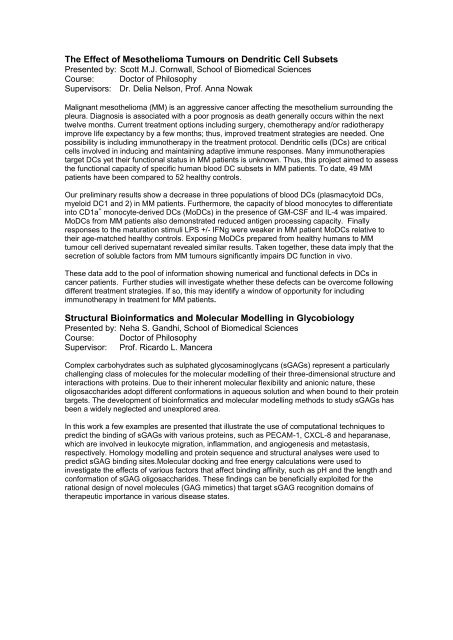
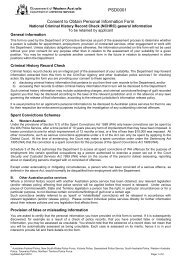
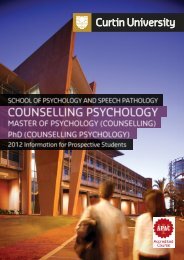
![Mental health commission report July 2010 - June 2011 [.pdf]](https://img.yumpu.com/50755705/1/184x260/mental-health-commission-report-july-2010-june-2011-pdf.jpg?quality=85)
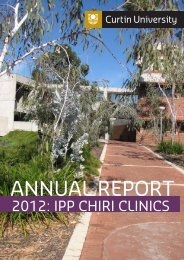
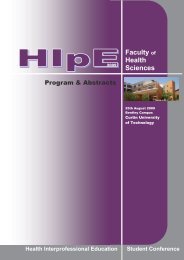
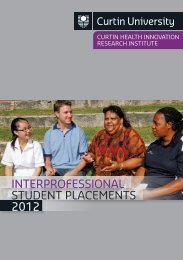
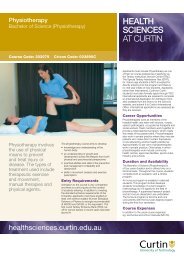
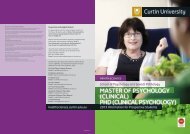


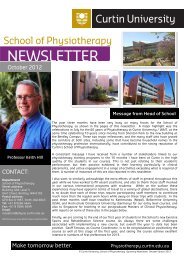
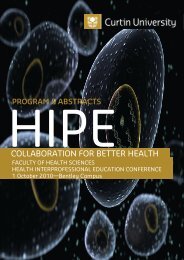

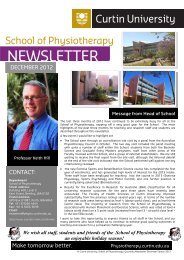
![2007 Annual Report [.pdf] - Health Sciences - Curtin University](https://img.yumpu.com/44476724/1/184x260/2007-annual-report-pdf-health-sciences-curtin-university.jpg?quality=85)